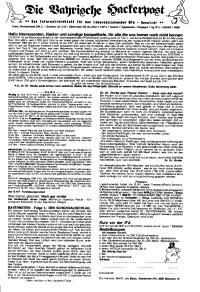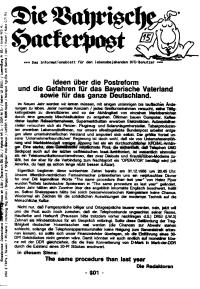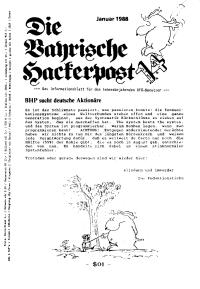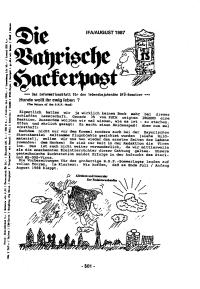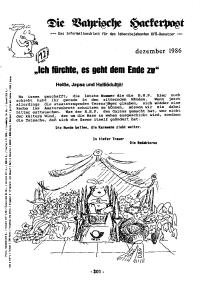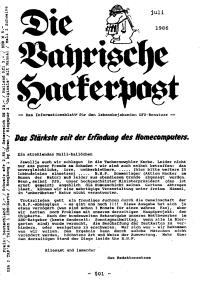Copy Link
Add to Bookmark
Report
Cider Digest #1349

Subject: Cider Digest #1349, 3 November 2006
From: cider-request@talisman.com
Cider Digest #1349 3 November 2006
Forum for Discussion of Cider Issues
Dick Dunn, Digest Janitor
Contents:
rapid-fire digests (Cider Digest)
RE:Apples in Prosser ("shawn carney")
Re: question (Claude Jolicoeur)
Roxbury Russet experience (Tim Bray)
Re: sulphury cider (Tim Bray)
Re: Liberty (Terry Bradshaw)
re: Carbonation in French style ciders (Terry Bradshaw)
Re: Cider Digest #1347, 30 October 2006 (Ian Merwin)
confused Campden (Dick Dunn)
fresh oakwood (verlindetaal)
Send ONLY articles for the digest to cider@talisman.com.
Use cider-request@talisman.com for subscribe/unsubscribe/admin requests.
When subscribing, please include your name and a good address in the
message body unless you're sure your mailer generates them.
Archives of the Digest are available at www.talisman.com/cider
----------------------------------------------------------------------
Subject: rapid-fire digests
From: cider-request@talisman.com (Cider Digest)
Date: Wed, 1 Nov 2006 21:45:20 -0700 (MST)
Apologies if the two recent digests caused any problems--1347 and 1348
within a day. There was a burst of traffic in reply to 1347. Also, there
were notes about the upcoming-VERY-soon Cider Day this weekend, and I
wanted to be sure that got out ASAP.
I don't want to hold off a digest if there's enough content. If I hold it
too long then I have to split it on the spur of the moment and hold some
articles, then send out explanations to the authors of the held articles,
blah, blah, blah. So overall it's just easier to send 'em as they happen.
- -el custodio
------------------------------
Subject: RE:Apples in Prosser
From: "shawn carney" <scarney88@hotmail.com>
Date: Tue, 31 Oct 2006 15:50:24 -0700
>some very pleasant surprises, among them Kingston Black, Ellis Bitter, and
>the Dieppe twins of Normandy.
You must be talking about the three Muscadet's? (Muscadet de Bernay,
Muscadet de Dieppe, Muscadet de Bernay).
>I haven't got the capacity to measure them, other than my taste
>buds. However, obviously, sugars are considerably higher, consistently 2-3
>degrees higher than the Long Ashton specs.
What do the Long Ashton specs taste like?
>Water's the key in this
>climate, I'm convinced. So Bob, do NOT irrigate cider varieties like the
>commercial growers do around Prosser. And by the way, you've got some of
>the best soil in the world for what you're after.
Ok, on a more serious note. What do you mean by do NOT irrigate like the
commercial growers? Do you recommend irrigating more or less than the
commercial growers? I would think you probably wouldn't want to over
irrigate in the spring and before harvest with any fruit. in the summer
(June, July, August, and September) I would think that you would want the
soil to stay moist (the top soil should be moist enough to hold its form
when you squeeze it into a ball in your hand almost like play dough). I
think our climate in Western Colorado is similar to Eastern Washington, we
get about 10 inches of rainfall per year. In the summer months (with micro
sprinklers) we irrigate at 55-60 gal per minute per acre for 12 hours every
three days. In the spring and fall I irrigate ?as needed?. I don't
know if I would want to irrigate much less. Or are you suggesting more?
Thanks,
Shawn Carney
Cedaredge, CO
------------------------------
Subject: Re: question
From: Claude Jolicoeur <cjoli@gmc.ulaval.ca>
Date: Tue, 31 Oct 2006 20:23:13 -0500
In Cider Digest #1348, 31 October 2006
>Subject: question
>From: Denise Elliott <delliott1@rochester.rr.com>
>Date: Tue, 31 Oct 2006 07:06:44 -0500
>
>I have been scanning around on the internet trying to find out what I
>should do next with my batch of cider. When I put it together I
>didn't "look before you leap" and I purchased 5 gallons of
>unprocessed cider and dumped in 5 lbs of sugar per cornell
>recommendations. I added Pasteur Champagne Yeast (one dry packet) and
>have kept it at 68*f. It has been fermenting like crazy for three
>weeks now, no bad smells. And here is my dilemma. I plan on bottling
>this as a sparkling cider. MY OG was at 1.064 and right now sg is
>1.046. I know it will be awhile till it finishes fermenting. If I
>drop in campdens tablets when I am at the desired SG will that kill
>off so much yeast that I can't bring it up to sparkling when I prime
>my bottles? Any one have any suggestions? Should I be allowing it to
>ferment at a lower temp? I have a root cellar that stays about 50*
>year round.....Thanks for any help you might be able to give
Denise,
I would definitely encourage you to put your cider in the cool cellar.
Please let it take his time. Good cider needs patient cidermaker... You may
let it ferment slowly to dryness, and then add a bit of sugar for priming
at bottling - no need to add Campdem tablets. Then you will need to wait
another 6 months before it gets to its fully mature taste. To give you an
idea, I am currently bottling my 2005 batches and I will only drink them in
a year from now - that is 2 years between starting the cider and drinking
it - and yes, this is quite long for a new cider maker who thinks will
drink the cider in a couple of months. But I might be a bit special - quite
a few digests back, I think I was considered as having the slowest ciders
among the digest members... But I do believe that the longer the cider will
take to make itself, the better it will be.
Claude Jolicoeur
------------------------------
Subject: Roxbury Russet experience
From: Tim Bray <tbray@mcn.org>
Date: Tue, 31 Oct 2006 18:47:49 -0800
Two CDs in two days! It must be cider season.
Roxbury Russet is one of my favorite apples, so this is not an objective
evaluation. (They grow superbly in my strange climate, they produce
heavily year-on-year, they taste great, they cook well, they keep
forever, and they make great cider. They aren't particularly bothered
by scab, even in the really bad years. What's not to like?)
"Rich and nutty" is apt, and that nutty character does persist to some
degree in the finished cider. I don't get anywhere near that much
sugar, probably because the hottest day of the year hits 80F. But mine
aren't that sharp either. In a 2004 batch I blended 80% Roxburies and
20% Porters Perfection, getting a juice of SG 1.068 and 0.63% acidity
(no pH measurement, apparently).
The acidity may have been much higher when picked, mid-October, than
when pressed in mid-December. Roxburies keep very well and I like a
low-acid cider, so I tend to sweat the apples as long as possible; I
like to see my Roxburies turn yellow before I press them. I think the
juice has more character when late-pressed, and certainly starch isn't a
problem.
The long keeping suggests to me that they probably do have fairly high
acid levels when picked. RR keeps a lot better than Golden Russet in my
experience. I once pressed some in March that I had forgotten about...
I have about a bushel of Roxburies in storage and at least that much
more still hanging on the trees. I leave them on as long as possible,
but they are so large that the wind shakes them off. We haven't had any
wind yet this year so they got an extra 2 weeks to hang on the tree.
Picked the Goldens 2 days ago and will press them this weekend, but the
Roxburies will probably hold for another 2 weeks at least.
What's the bittersweet juice you're planning to blend with the Roxbury?
Cheers,
Tim in Albion, CA
------------------------------
Subject: Re: sulphury cider
From: Tim Bray <tbray@mcn.org>
Date: Tue, 31 Oct 2006 19:02:08 -0800
> A friend and I are trying our hand at our first batch of hard cider.
> We have 8 carboys with a variety of single and blended cider. Three
> of the carboys are filled with Ruston Pippin cider and Kingston Black
> cider which we read are near perfect in composition for hard cider.
That sounds great! Where did you get the juice? For that matter, where
do you live? With 40 gallons of cider you could be quite popular.
> > We have done our first racking and notice in all the carboys a very
> distinct sulphur smell.
Not to worry, this is common.
> > Was this due to insufficient oxygen during primary fermentation?
> Will it go away? On its own or by adding DAP or some nutrient?
It will almost undoubtedly go away on its own. You're going to age your
cider for months after it's done fermenting, during which time a lot of
things will change. You don't need DAP or any other nutrients in cider.
Certain strains of yeast are notorious sulfur producers - Montrachet in
particular. Wild yeasts often give off various nasty smells. You
didn't say what yeast you used, if any, or if you sulfited the juice.
> > Additionally, all the ciders were bland - not sweet, not tart, etc.
> Is this to be expected at this stage?
Hmmm, that sounds a bit odd. They should have been overwhelmingly sweet
before fermentation. During fermentation, ciders usually taste awful -
yeasty and sharp.
> > Are we screwed?
I don't think so. Relax! Cidermaking is a slow process. You'll be
amazed how much better the stuff gets after 9 months in the bottle.
Especially leave that Kingston Black cider alone until it has aged.
Cheers,
Tim in Albion, CA
------------------------------
Subject: Re: Liberty
From: Terry Bradshaw <terryb@lostmeadowvt.com>
Date: Wed, 01 Nov 2006 09:36:02 -0500
Whoa there, Dick! I'm not used to digests coming so fast...here's my
thoughts on Liberty.
I have been using Liberty in my cider since day one. That day being when my
first batches were straight McIntosh and a straight Liberty. Naturally the
Lib trounced the Mac, but I still didn't know what I was doing. There are
a lot of Liberty trees at the orchards where I work, and for may years I
used a mill that wouldn't squeeze sprayed fruit, so the Lib fit the bill,
being scab-resistant and so putting out a decent unsprayed crop.
Liberty is a very good cider apple, but I would be hesitant to out it into
a single-variety batch. Its pleasing tartness in a blend gets overpowering
and the tannin, while there, isn't enough to give the juice much body.
In lieu of high-tannin cider varieties I have found crabs to perk up
a liberty cider, but you have to watch that things don't get too acid.
High acid Lib-based ciders respond well to MLF, I have found.
Now that I am using low-acid bittersweets I have found Liberty to be a key
part of the blend to pull the pH down and add some acid perk to things.
My best cider from 05 was a 2 Liberty : 3 Bittersweet (Dabinett, Aston,
Yarlington, Chisel Jersey) blend which really got good about ten months
after pressing. When using bittersweets with Liberty I think that MLF
would be a bad thing and so avoid it.
One important note on Liberty as both a dessert and a cider variety is
that the character changes dramatically with the time left on the tree
near ripening. Many pick them too early when they are too acid and have
poor flavor. I find the last week in September to be near perfect in the
Champlain Valley of Vermont. You have a window of one week to ten days
before they go down, losing their acid sparkle and turn bland and mealy.
The same qualities go for cider, I believe, although they are probably
best for blending when picked at the late end of their window.
And as a tree, Liberty is amazing in that you can't seem to stop it from
fruiting if you tried, to a fault,
My $0.02.
TB
================
Terence Bradshaw
Calais, VT
1450 feet, zone 4
http://www.lostmeadowvt.com
------------------------------
Subject: re: Carbonation in French style ciders
From: Terry Bradshaw <terryb@lostmeadowvt.com>
Date: Wed, 01 Nov 2006 09:51:12 -0500
I'd agree with you to some extent on the 'expectation' in the guidelines
(more likely by certain judges) for intense carbonation. Frankly I think
that a lot of the intense carbonation of French ciders that have found
their way to the US is the product of microbial spoilage in the bottle.
(I haven't been to France to try the ciders there.)
That said, I believe that many clear but carbonated ciders are naturally
conditioned in a bright tank then sterile filtered before counterpressure
bottling. By paying very close attention to sugar levels going in and
coming out of the tank it is possible to do this without force carbing,
I believe. That said, I would prefer ciders with a bit less 'prickle'.
TB
================
Terence Bradshaw
Calais, VT
1450 feet, zone 4
http://www.lostmeadowvt.com
------------------------------
Subject: Re: Cider Digest #1347, 30 October 2006
From: Ian Merwin <im13@cornell.edu>
Date: Wed, 1 Nov 2006 21:54:48 -0500
Folks-
Responding to questions about Liberty and Roxbury Russet--even when
fully ripe, most russets are still very tart. For more info on this
and other cider varieties, there is a recent (July 2006) publication
by Sarah Valois in the Journal of the American Pomological Society
based upon her MS thesis research, with information on the chemical
attributes of Roxbury Russet and some other old American and European
cider apple varieties.
Sarah (now Dr.) Valois continued research on cider apples and
fermentation methods for her PhD at Cornell University, and one of
her projects involved various fermentation temperatures and
yeast-available-nitrogen treatments with juice from Liberty apples.
Sarah made a single variety Liberty cider (fermented at 12 C, with
EC1118 yeast and yeast nutrients (Fermaid), fermented to dryness and
then sweetened before bottling to 2% residual sugar, stabilized with
Velcorin) was really superb. It was one of the most apple-aromatic
ciders I've tasted. Very clean and crisp. Somewhat like a good
semi-dry Riesling in sugar/acid blance and floral aromatics.
Liberty is one of the few modern American varieties that has some
useful tannin levels (probably derived from its Malus floribunda
forbears, which contributed its scab immunity genes as well) and
provides enough acidity to help keep a cider pH in the low 3s. It is
a vigorous, cold hardy, very productive variety that is ideal for
organic or low-spray production and could provide a low- pH base
juice for blending with bittersweets or other types such as the
russets. It is probably something that more cidermakers should be
growing, along with GoldRush (another new apple that is scab immune,
very sharp and sweet) and the Roxbury and Golden Russets.
- --
(((((((((((((((((((((((((((((!)))))))))))))))))))))))))))))
Ian A. Merwin, PhD
Prof. of Horticulture & International Agriculture
118 Plant Science Bldg
Cornell University, Ithaca, NY, USA, 14853
Telephone: 607-255-1777
<www.hort.cornell.edu/department/faculty/merwin/index.htm>
------------------------------
Subject: confused Campden
From: Dick Dunn <rcd@talisman.com>
Date: Thu, 2 Nov 2006 22:40:16 -0700
I'm still trying to sort through all of this, so this is a preliminary
note. If you're sulfiting cider using Campden tablets, in the US (probably
in North America), beware of over-strength Campden tablets.
This began with some calculations where I couldn't figure out what was
going on, plus some notes about a year ago in the Cider Digest from Donald
Davenport, and replies to his note.
Donald had used Campden tablets for a cider, then found that he couldn't
get fermentation to start, then studied the tablets and concluded from the
labeling that they were roughly triple the strength they should be.
Not quite. They were only (!) double-strength - so still more than enough
to damage his attempt. At least we -think- they were double-strength,
although with conflicting package information, who knows?!?
The definition for a Campden tablet is that it should provide 50 ppm of
SO2 when added to a gallon of must. The specific definition goes back to
a UK gallon, which is about 20% more than a US gallon...so we might expect
more like 60 ppm in the US. But, for example, Donald's package of tablets
indicated 150 ppm from one tablet in one gallon. That's way off the end
of the scale.
Moreover, even a rough calculation shows that a normal-sized tablet can't
possibly contain enough to get 150 ppm/gal.
There's another bit of confusion from the compounds used--it can be either
sodium metabisulfite or potassium metabisulfite, and this can make almost
20% difference. If a dolt-ish manufacturer presses tablets from one of
these using a formula from the other, it can throw off the SO2 content.
Oh, and there's also the matter of how much binder (inert ingredient) it
takes to make up a tablet!
The best I can suggest is to buy a crystalline compound, probably potassium
metabisulfite, and make up a solution for your cider. Follow the notes
on Andrew's web site!
I hope to fill in the gaps soon. In the meantime, in the US, beware that
a Campden tablet might not be what "the books" say it should be!! I'm
going to try to get some actual measurements.
- --
Dick Dunn rcd@talisman.com Hygiene, Colorado USA
------------------------------
Subject: fresh oakwood
From: verlindetaal <djtaal@planet.nl>
Date: Fri, 03 Nov 2006 18:47:28 +0100
Hello,
I've restored the oakwood off an old press 130 liter and started quite
naive with pressing.
Those are a lot of tannines I can tell you and what colour! I imagine this
makes cider to keep for a long time.
I have given it a lot of showers now. Anyone experience with fresh wood and
how (long) it takes to minimalise this effect?
Dirk Taal
------------------------------
End of Cider Digest #1349
*************************














